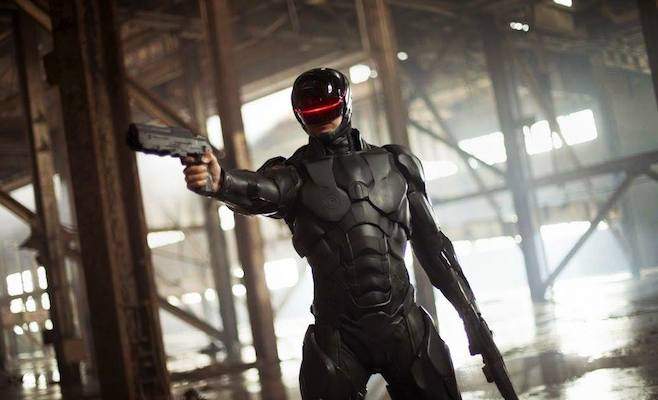RoboCop
1987's RoboCop is remembered as a classic. What of 2014's go-around?
Overview
The year is 2028, and Detroit crime is out of control. At least, that's what we're told. The city, frankly, has never looked better. But trust us: lots of crime. Omnipresent corporation OmniCorp is trying to get its new robot cops approved for use in the US, but Washington won't allow machines to have control over life and death. Enter noted human Alex Murphy, An Honest Detroit Cop who, thanks to a pesky explosion, is now in desperate need of a robotic suit that will keep him alive and also help fight crime. The two were meant to be together!
If you haven't seen the original 1987 RoboCop, then fix that right now. It combines the two best things about 1980s cinema: a dystopian science fiction setting and a cop taking out drug dealers and other corrupt cops. But it's remembered as a classic, however, because of how sharply it satirises American culture. It may look like a dumb action film, but it's clever as hell.
This 2014 remake is, at least, clever enough to aim for the same target. It opens with a right-wing talk show pundit and a futuristic — but all too familiar — Middle East war on terror. Rather than simply imitating classic scenes from the original, this new film sets out to do its own thing, to update the references, and that attempt is admirable.
The problem is that this satire — which we'll come back to — is hung upon a fairly piecemeal story. There's little that propels it forward, and we're never left wondering how things could possibly turn out for our heroes. The mysteries are barely concealed; the nefarious plots, basic; the villains, flagged in the opening scenes. Minutes after the film is over, you'll be left with a few key images, but no idea what actually happened.
Joel Kinnaman plays Murphy/RoboCop, and does a decent job with it. Murphy's hardly the most compelling character, but the struggle to maintain his humanity is handled with more care than most films of this ilk would bother with.
The rest of the cast is more recognisable, filling out supporting roles with the likes of Samuel L Jackson, Gary Oldman, Michael Keaton, Abbie Cornish, Jackie Earle Haley, Michael K Williams, Jennifer Ehle and Jay Baruchel.
The satire, though welcome, ultimately fails. Samuel L Jackson's talk show host gives the feeling that they reverse-engineered a conservative pundit based on Stephen Colbert's famous parody, and his appearances consistently bring the film to a screeching halt. Not only could these scenes be lifted out without any noticeable change to the story, but the film would actually flow better without this particular social commentary. And maybe that's the most trenchant point of all.





